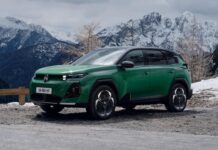Subaru Forester: A Rugged and Dependable SUV
The Subaru Forester has been a pioneer in the compact SUV segment since the mid-1990s, and the latest generation continues to offer a compelling blend of ruggedness and dependability. While lacking the plush interiors or sleek digital interfaces found in some European and Korean rivals, the Forester compensates with a pleasing sturdiness and a legacy of Subaru’s longstanding reputation for reliability.
A Significant Evolution
The newest Forester represents a substantial evolution of the previous model, featuring extensive modifications across styling, interior technology, chassis, and powertrain. The exterior boasts a refreshed front end, a lower window line for improved visibility, and a stiffer chassis coupled with suspension upgrades that minimize body sway.
Key Features:
- Revised Styling: A modern, fresher front-end design.
- Enhanced Visibility: Lowered window line for better over-the-shoulder and rear passenger views.
- Improved Ride: 10% stiffer chassis and suspension revisions reduce body sway.
- Trim Options: Available in Limited, Field, and Touring trims, starting from £40,000.
Performance and Driving Experience
While not particularly fast, the Forester delivers a confidence-inspiring driving experience thanks to its responsive handling and comfortable ride. It features a unique horizontally opposed (boxer) engine and a standard four-wheel-drive system.
Pros:
- Responsive Handling: Agile and neutral in character.
- Comfortable Ride: Soft suspension provides a comfortable driving experience.
- Standard Four-Wheel Drive: Provides excellent traction and stability.
Cons:
- Modest Performance: Powertrain may feel lacking compared to some rivals.
- Dated Interior: Interior design feels behind the times.
MPG and Running Costs
The Forester’s hybrid technology doesn’t deliver significant fuel savings, and the standard four-wheel-drive system impacts fuel efficiency.
Fuel Economy: Official WLTP figure of 34.9mpg, achieving 38.1mpg in testing.
Insurance Group: 23
Tax: Luxury car tax applies to trims above the entry-level Limited.
Depreciation: Expected to hold 48-50% of its value.
Interior, Design & Technology
The Forester’s cabin feels solid but lacks the modern sophistication of some competitors.
Pros:
- Durable Construction: Robust materials and construction quality.
- Functional Infotainment: 11.6-inch touchscreen with wireless smartphone mirroring.
- Excellent Visibility: Large windows and a low window line enhance outward visibility.
Cons:
- Outdated Design: Interior styling feels dated.
- Laggy Infotainment: Touchscreen can be slow to respond.
Boot Space & Practicality
The Forester excels in practicality, offering generous space for both passengers and cargo.
Cargo Capacity: Less luggage space than some rivals, despite generous passenger room.
Dimensions: Slightly longer than the Hyundai Tucson.
Overall, the Subaru Forester remains a solid choice for those seeking a dependable and capable SUV. While it may lack the cutting-edge features of some competitors, it compensates with a proven track record, rugged design, and a focus on practicality.



































